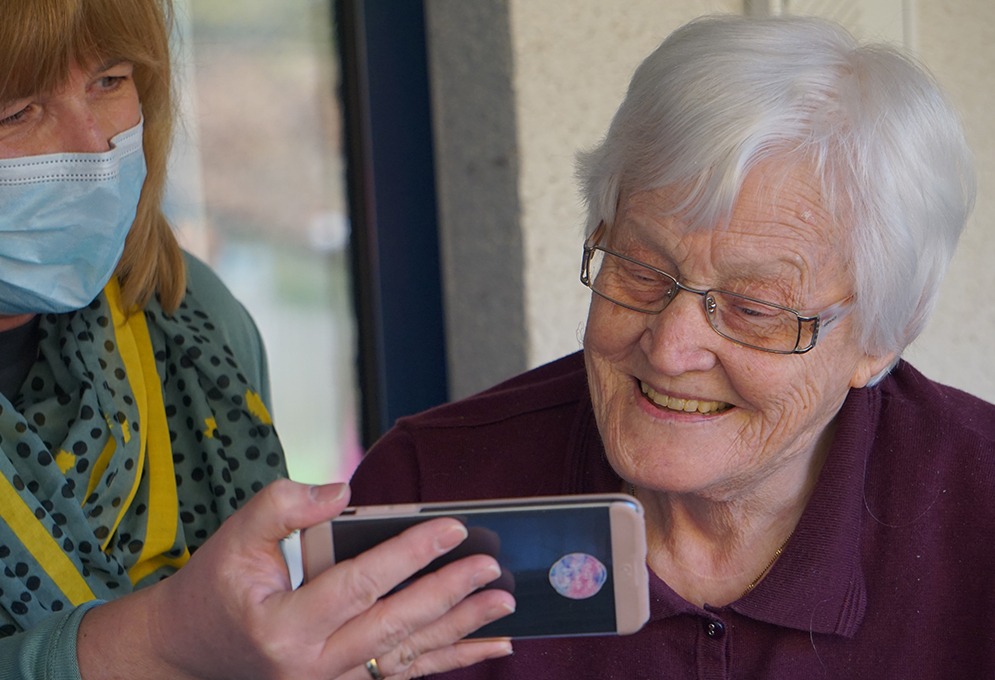Tech Tools for Family Caregivers

Caring for an aging or ill loved one requires an almost expert ability to multi-task. The endless list of demands including coordinating care schedules, identifying safety hazards, managing complicated medications and staying up-to-date and informed can often leave caregivers overwhelmed and burnt out. Although it can be intimidating, technology can help to simplify some of these tasks and solve common caregiver challenges. If you are caring for a loved one, here are a few innovative tech tools you may want to consider:
Smart Home Technology
A connected smart home can allow your loved one to do things like turn off the lights, play music, adjust the temperature and control the television with simple voice commands. There are many different price points in smart home devices, but some such as Amazon Echo or Google Home are relatively inexpensive and easy-to-use and can be connected to other smart home equipment around the house. This can be as simple as plugging your appliances into smart plugs or it could involve a bigger investment in partner devices. This technology can be particularly beneficial if your loved one has any mobility, vision or other impairments. It can also make your own caring tasks significantly more efficient.
Health Sharing Apps
It can be time-consuming as a primary caregiver to manage things like updating your care circle, storing and organizing health information or keeping track of respite care. Apps specifically designed for caregivers like Carely Family Caring App, Lotsa Helping Hands or CaringBridge may be able to streamline these demands. Although each app is different, these programs offer a safe and secure place to store legal, financial and other essential documents, keep track of medical appointments, schedule meal trains and care calendars, connect with your support network or post centralized health updates. Most of these apps are free and function very well, but some of the more advanced versions come with a fee attached.
Medication Management
Keeping track of medications is one of the more challenging caregiving responsibilities—especially if you are supporting an older adult with memory challenges or multiple health concerns. Ranging from more expensive prescription dispensers like MedMinder that release medication doses at scheduled times to free apps like MediSafe that offer medication alerts, record missed doses and track refills, these technologies can help to prevent medication errors that are unfortunately common and dangerous.
Personal Emergency Response Systems
Falls and other medical emergencies are very concerning for older loved ones and the people that care for them. Research shows that the amount of time after an injury before a person receives assistance has a direct impact on hospitalizations and recovery time. Medical alert devices can be pendants or wristbands with emergency call buttons or more advanced systems that detect falls and automatically activate and call emergency services. These systems may involve a monthly fee but can help your loved one remain independent at home and offer you peace of mind. Just make sure that you select a medical alert company with positive customer reviews and with local monitoring centres.
Location Devices
Wandering is a common and dangerous dementia-related behaviour that can be a very serious concern for caregivers. Some people may not feel comfortable with tracking devices, but technology specifically designed for dementia patients is available if wandering becomes a significant problem. Wearable GPS trackers can be attached to the wrist, clothing or inserted into shoes and connected to a smartphone to help you find your loved one quickly. Some devices can even be set to alert you if your loved one leaves a certain geographic area.
With an aging population and a dramatic increase in unpaid caregivers, caregiving technology continues to improve. Although you may feel overwhelmed by the initial cost and time commitment, finding the right technology to support your day-to-day demands and your loved one’s independence can be life-changing.
You may also like:
